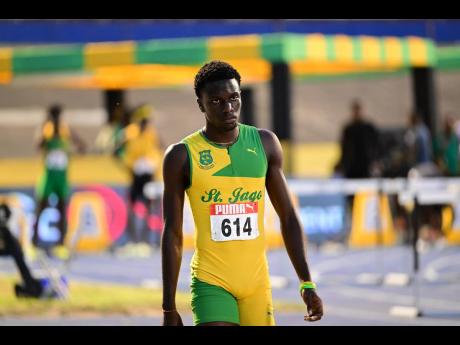False start rule robbing fans
Pitting the best against each other compromised by zero tolerance
SEVEN DAYS before the funeral service for Holmwood track patriarch Eddie Hector in Kendal, Manchester, British sprinter Zharnel Hughes ran a sparkling 200-metre race at the National Stadium in Kingston. When the service was over, motivated by that...
SEVEN DAYS before the funeral service for Holmwood track patriarch Eddie Hector in Kendal, Manchester, British sprinter Zharnel Hughes ran a sparkling 200-metre race at the National Stadium in Kingston. When the service was over, motivated by that run by Hughes, I made a beeline from Kendal to the Stadium to see him race over 100 metres.
Over hill and vale, from one toll plaza to another, from Manchester to Clarendon to St Catherine to Kingston, I motored to the Stadium to see Hughes disqualified on what I thought was a marginal false-start ruling. As a fan, I felt robbed.
The same thing happened at last year’s World Championships. Hometown favourite Devon Allen was ejected from the 110-metre hurdles final for a start violation invisible to the naked eye but caught by the false-start-detection system.
If there is intent to start, as measured by pressure on the blocks, in less than 0.10 seconds, that’s a false start. Allen’s reaction time was measured at 0.099 seconds. Like me on the day of Jah Eddie’s send-off, those fans must have felt robbed. After all, Allen was at home in Eugene, where he starred in track and American football, with the third fastest time in history at 12.84 seconds.
It’s hard to take the zero-tolerance false rule.
Its aim is to speed meets along by eliminating false starts. At Boys and Girls’ Championships, it is doing its job. In 2019, there were 44 false-start disqualifications, followed by 21 when Champs returned after the COVID-19 break and then 15 last year. The number rose to 27 this year.
Some of the decisions, like the Hughes elimination in March, the Allen red card in Eugene, and the ejection of young hurdler Demario Prince for an invisible false start at last week’s National Championships challenge logic.
However, the central distress is not the work and decisions of the starter and his team, and I’m not disputing their findings.
The stumbling block is the supremacy of zero tolerance and what it does to fans. Had Hughes, Allen, and Prince received second chances, as they would have with other versions of the false-start rule, things would be so much different.
The biggest false start of them all came in 2011 when Usain Bolt, then the undisputed king of track and field, moved early in the World Championship 100-metre final. Fans, who had paid good money to see him run, got up immediately and left in droves.
No version of the rule is perfect. The original rule gives each athlete one false start to burn and could take a long time. The middle version places one false start on the field before disqualifications begin, and the version we have now throws the fan under the bus.
However, systems of punishment are graded by severity and to levy the heaviest penalty for a first offence, as is done with the zero-tolerance false-start rule, goes against the grain. With the media standing by to go to regular programming, the false start has become a capital crime.
Counterbalancing that is the fan who is watching in person or remotely. All he wants to see is the best race against the best.
Hubert Lawrence has made notes at track side since 1980.

